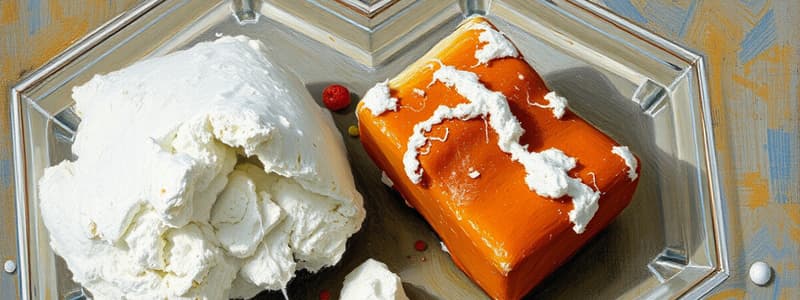Podcast
Questions and Answers
What is an element?
What is an element?
- A homogeneous mixture
- A mixture of two or more substances
- A substance with atoms of different identities
- All atoms in a substance have the same identity (correct)
What defines a compound?
What defines a compound?
- A substance that cannot be broken down
- A substance with two or more kinds of atoms combined (correct)
- A single type of atom
- A material made up of two or more substances
What is a mixture?
What is a mixture?
A material made up of two or more substances.
What is a homogeneous mixture?
What is a homogeneous mixture?
What characterizes a heterogeneous mixture?
What characterizes a heterogeneous mixture?
What does the Tyndall effect refer to?
What does the Tyndall effect refer to?
Define a physical property.
Define a physical property.
What is a physical change?
What is a physical change?
A characteristic that indicates whether a substance can undergo a certain chemical change is a chemical property.
A characteristic that indicates whether a substance can undergo a certain chemical change is a chemical property.
State the Law of Conservation of Matter.
State the Law of Conservation of Matter.
What is the boiling point?
What is the boiling point?
Define kinetic theory.
Define kinetic theory.
Solids have a definite shape and volume, while ________ adjust their shape to that of their container.
Solids have a definite shape and volume, while ________ adjust their shape to that of their container.
What happens during evaporation?
What happens during evaporation?
What is thermal energy?
What is thermal energy?
Flashcards are hidden until you start studying
Study Notes
Classification of Matter
- Element: A pure substance where all atoms share the same identity.
- Compound: A substance formed from two or more different elements, combined in a fixed proportion.
- Mixture: A combination of two or more substances that retain their individual properties.
Types of Mixtures
- Homogeneous Mixture: Evenly blended mixture, also known as a solution; components are indistinguishable.
- Heterogeneous Mixture: Mixture with visibly different substances; proportions can vary and components are easily separated.
- Colloid: A mixture where particles are larger than in solutions but small enough to remain suspended, exemplified by the Tyndall Effect, which is light scattering by colloidal particles.
- Suspension: A heterogeneous mixture where larger particles float and may settle over time.
Properties and Changes of Matter
- Physical Property: Observed without changing the substance’s identity, e.g., color, melting point.
- Physical Change: Transformation that alters a substance's form but not its chemical identity; includes changes in state or shape.
- Distillation: Process utilizing boiling point differences for separating components in mixtures.
- Chemical Property: Indicates a substance’s potential to undergo chemical changes or reactions.
- Chemical Change: Process leading to the conversion of one substance into another distinct substance.
Mass and Energy Concepts
- Law of Conservation of Matter: Matter is neither created nor destroyed; atoms are rearranged.
- Law of Mass: Total mass before a chemical change equals total mass after the change.
- Kinetic Theory: Explains particle behavior in matter; all matter consists of small particles in constant motion that collide with each other and container walls.
States of Matter
-
Solids: Particles closely packed in a fixed arrangement; definite shape and volume; undergo melting when heated.
-
Melting Point: Temperature at which a solid transitions to a liquid due to increased particle energy.
-
Heat of Fusion: Energy required to convert a solid at its melting point into a liquid.
-
Liquids: Particles with more kinetic energy than solids; take the shape of their container while retaining a definite volume; flow due to sliding particle motion.
-
Boiling: Occurs when a liquid's vapor pressure equals atmospheric pressure, leading to the formation of gas throughout the liquid.
-
Evaporation: Surface phenomenon where liquid turns into gas without boiling.
-
Vaporization: Process enabling some liquid particles to escape into the gaseous state.
-
Boiling Point: Temperature at which vapor pressure of the liquid equals the surrounding pressure.
-
Heat of Vaporization: Energy needed to convert a liquid at boiling point into gas.
Nature of Gases and Other States
-
Gases: Particles do not have a definite shape or volume and fill their container.
-
Heating Curve: Represents the transition from solid to liquid to gas; temperature remains constant during phase changes as energy is used to overcome attractions between particles.
-
Plasma: Matter composed of charged particles (ions and electrons) that are overall neutral but exhibit unique properties.
-
Kinetic Energy: Related to the speed of particles; higher kinetic energy correlates with higher temperature.
-
Thermal Energy: Total energy of all particles in a material, causing vibrations in their positions.
Studying That Suits You
Use AI to generate personalized quizzes and flashcards to suit your learning preferences.




